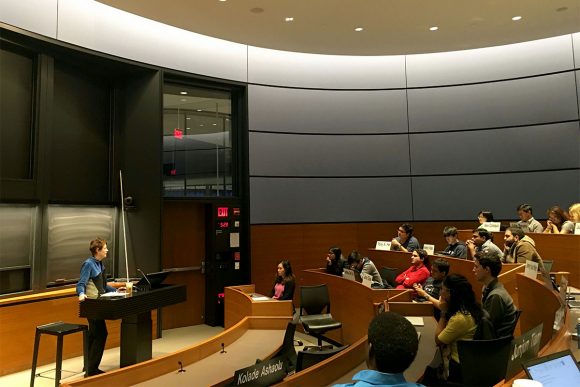
Leadership During Climate Change
Prior to entering the Master of Advanced Management (MAM) program, I had the opportunity to participate in the first edition of the Yale SOM Low-Carbon Portfolio Case Competition with other colleagues from my MBA program at EGADE Business School. During that experience I learned about how important it is to consider environmental, social, and political factors when outlining potential long-term performance for investors. Now that I have joined the MAM program, I continue to learn about key global issues and how we, as future investors, business leaders, and governmental actors, must think about the complex interplay between various factors. Among these issues to note is the much-discussed problem of climate change.
On November 9, as part of the MAM Colloquium in Advanced Management, I attended a talk by Frances Beinecke YC ’71, FES’ 74, former president (2006-2014) of the Natural Resources Defense Council (NRDC). NRDC is a leading nonprofit organization whose purpose, as described by Beinecke, is “to design, implement, and enforce environmental laws in the United States.”

The climate change field in which Beinecke has worked for more than 20 years has become an area of opportunity where “the needs are in trillions, not billions,” she said. Yale SOM has distinguished itself as a school that fosters management education through the lens of business and society. That approach, Beinecke believes, is critical in addressing climate change because a “partnership between the private and public sector is going to be very important in how climate change is targeted.”
From a policy standpoint, she talked about the 2015 United Nations Climate Change Conference in Paris, where more than 155 countries will come together to try to reach a binding agreement to address these environmental and societal issues. Each country has set its own targets, but the discussions in Paris are critical to determining if it will be possible to institute an organized system of review and accountability. Beinecke pointed out that progress will require engagement from civil society as well, not just governments: “After working a lot with policy, you cannot get policy to work if there is no public will.”
Beinecke also spoke about the renewable energy sector in the U.S., for which she believes there is more political support and within which more jobs are being created. States such as California, and even Texas, are developing strategies to continue adopting renewables in the coming years.
Beinecke’s impressive talk is one of the many interactions MAM students have had with transformational leaders. It is my wish that the upcoming U.N. conference is a success and will lead to great outcomes for the planet. We need responsible citizenship not just from our companies but also from our governments. The pledges being made are inspiring; if enforced, they will contribute positively to the long-term performance of the environment and our societies.
